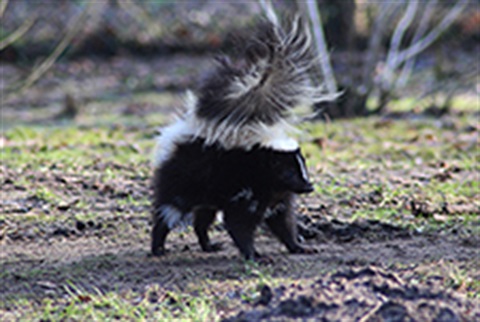Skunk in Fort Lupton Neighborhood Tests Positive for Rabies
Published on November 10, 2020

Weld County — A skunk found on a residential property in the Aristocrat Ranchettes neighborhood in Fort Lupton has tested positive for rabies. A concerned citizen noticed the skunk early in the morning on November 6, 2020 and notified Weld County Animal Control. Colorado Parks and Wildlife picked up the skunk and submitted it to Colorado State University laboratory for testing. Although there were no known exposures, Colorado Parks and Wildlife agreed to test the skunk for surveillance purposes.
Public health officials are asking that if you or someone you know, touched or handled the skunk, or if any pet had physical contact with it, to contact the Weld County Health Department at (970) 400-2290. Rabies is nearly 100% fatal if left untreated. Rabies can infect any wild animal, including foxes, skunks, raccoons, coyotes, and bats. Bats and skunks are the two main sources of rabies in Colorado. It’s important to note that not all skunks have rabies. If a skunk is acting strangely, however, such as lying on the ground, out during daylight hours, exhibiting loss of motor skills, or acting aggressively, it may be sick.
Health officials stress that all domestic animals, such as cats, dogs, horses and livestock should be vaccinated against rabies by a licensed veterinarian. Over the past several years, a variety of animal to human contacts has resulted in several dozen Weld County residents requiring rabies immune globulin for post-exposure treatment.
Rabies is a disease caused by a virus that affects the nervous system. Rabies causes inflammation of the brain and spinal cord and is nearly always fatal. It is transmitted in saliva through the bite of an infected animal. The virus can also be transmitted in saliva to an open cut, scratch, or wound. If a person suspects they have been exposed to rabies, they should contact their medical provider immediately. Effective vaccination treatment is available to prevent rabies if started before symptoms appear. There have been no human deaths related to rabies exposure in Weld County.
To prevent exposure to rabies:
- Do not feed, touch, or handle any wild animals.
- Have dogs, cats, horses, and livestock vaccinated regularly by a licensed veterinarian.
- Spay or neuter pets to reduce the number of unwanted or stray animals in the neighborhood.
Contact the Health Department at (970) 400-2290 for questions or if anyone had contact with the skunk. For after-hours (outside of 8:00 a.m. - 5:00 p.m., Monday - Friday), contact Weld County Dispatch at (970) 350-9600 and select option 4.